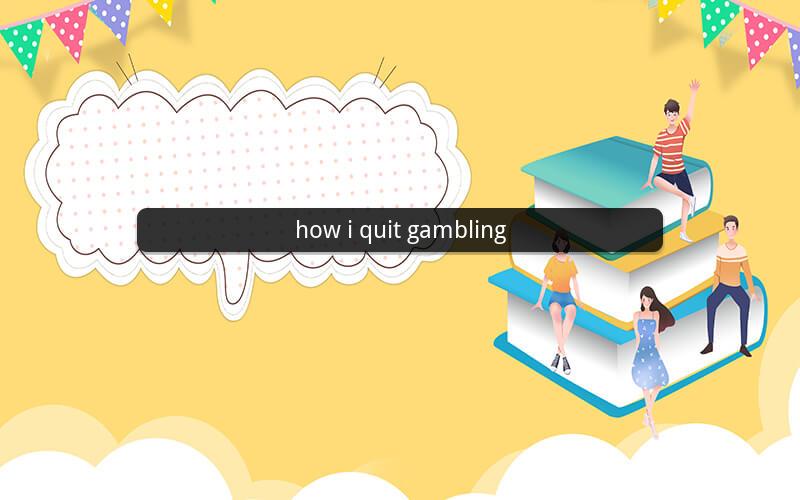
Table of Contents
1. Introduction
2. The Decision to Quit
3. Understanding the Problem
4. Seeking Support
5. Developing a Plan
6. Overcoming Temptation
7. Dealing with Withdrawal
8. Building a New Lifestyle
9. Celebrating Milestones
10. Maintaining Sobriety
Introduction
Gambling has been a pervasive issue for many individuals, leading to significant financial, emotional, and social consequences. Quitting gambling is a challenging endeavor that requires determination, self-awareness, and support. This article aims to provide insights and guidance on how one can successfully quit gambling and rebuild their life.
The Decision to Quit
The first step in quitting gambling is making the decision to do so. This decision often comes after realizing the negative impact gambling has had on one's life. It may be prompted by a series of failed attempts to control gambling, financial difficulties, or the loss of relationships. Once the decision is made, it is crucial to commit to it wholeheartedly.
Understanding the Problem
Understanding the nature of gambling addiction is essential in the quitting process. Gambling addiction is characterized by an inability to control gambling behavior, despite experiencing negative consequences. It is a chronic condition that can be influenced by various factors, including psychological, social, and environmental elements. Recognizing these factors can help in addressing the root causes of the addiction.
Seeking Support
Seeking support is a vital aspect of quitting gambling. Support can come from family, friends, or professionals. Joining a support group, such as Gamblers Anonymous, can provide a sense of community and understanding from individuals who have faced similar challenges. Additionally, consulting with a therapist or counselor can offer personalized guidance and coping strategies.
Developing a Plan
Creating a comprehensive plan is essential to quitting gambling. This plan should include setting specific goals, identifying triggers, and establishing coping mechanisms. Setting goals can provide motivation and a sense of direction. Identifying triggers, such as certain places or situations that trigger the urge to gamble, helps in avoiding them. Coping mechanisms can include engaging in alternative activities, practicing mindfulness, or seeking emotional support.
Overcoming Temptation
Temptation to gamble can be strong, especially during moments of stress or boredom. Overcoming temptation requires discipline and resilience. Some strategies to overcome temptation include removing access to gambling websites or apps, avoiding high-risk environments, and seeking alternative activities that can provide the same level of excitement or entertainment.
Dealing with Withdrawal
Withdrawal symptoms are common when quitting gambling. These symptoms can include irritability, anxiety, depression, and insomnia. Managing withdrawal symptoms is crucial to maintaining sobriety. Techniques such as relaxation exercises, meditation, and maintaining a healthy routine can help alleviate these symptoms.
Building a New Lifestyle
Building a new lifestyle that does not involve gambling is essential for long-term recovery. Engaging in hobbies, exercising, and cultivating social connections can provide fulfillment and distract from the urge to gamble. Developing a routine that includes positive activities can help create a new identity and replace the emptiness caused by gambling.
Celebrating Milestones
Celebrating milestones is a powerful way to maintain motivation and acknowledge progress. Whether it's a week, a month, or even a year without gambling, acknowledging these milestones can provide a sense of accomplishment and reinforce the decision to quit.
Maintaining Sobriety
Maintaining sobriety is a lifelong journey. Relapse is a possibility, but it is crucial to view it as an opportunity to learn and grow. Building a strong support network, practicing self-care, and staying vigilant about triggers can help prevent relapse. Continuously seeking professional help and attending support group meetings can provide ongoing support and guidance.
Questions and Answers
1. How long does it take to quit gambling?
There is no fixed timeline for quitting gambling. It varies from person to person, depending on the severity of the addiction and the individual's commitment to recovery.
2. Can I quit gambling on my own?
While it is possible to quit gambling on your own, seeking support from others, such as family, friends, or professionals, can significantly enhance the recovery process.
3. Will I experience withdrawal symptoms when quitting gambling?
Yes, withdrawal symptoms are common when quitting gambling. They can vary in intensity and duration, but they can be managed with appropriate strategies and support.
4. Can I still enjoy leisure activities without gambling?
Absolutely! There are numerous leisure activities that can provide excitement and entertainment without involving gambling. Exploring new hobbies, engaging in sports, or attending social events can be fulfilling alternatives.
5. How can I stay motivated during the quitting process?
Staying motivated requires setting realistic goals, celebrating milestones, and maintaining a strong support network. Reminding yourself of the reasons for quitting can also serve as a source of motivation.
6. Can I gamble responsibly if I have a gambling addiction?
It is difficult to gamble responsibly if you have a gambling addiction. The urge to gamble can be overwhelming, and it is crucial to seek professional help and support to address the underlying issues.
7. Will I ever be able to gamble again without developing an addiction?
It is possible to gamble again without developing an addiction, but it requires being aware of personal limits, practicing self-discipline, and seeking support when needed.
8. Can my family and friends help me quit gambling?
Yes, family and friends can play a significant role in supporting your recovery. They can provide emotional support, help you identify triggers, and hold you accountable.
9. What if I relapse after quitting gambling?
Relapse is a possibility, but it is not the end of the road. It is important to view relapse as an opportunity to learn and seek additional support. Professional help can be beneficial in navigating through the relapse and restarting the recovery process.
10. Can I still have a fulfilling life without gambling?
Absolutely! A fulfilling life without gambling is possible. It requires building a new routine, engaging in meaningful activities, and fostering relationships that support your recovery.